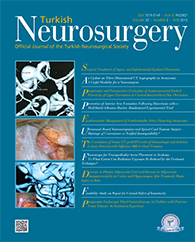2Maltepe University, Faculty of Medicine, Department of Medical Pharmacology, Istanbul, Turkey
3Baskent University, Faculty of Medicine, Department of Pathology, Istanbul, Turkey
4Marmara University, Faculty of Pharmacy, Department of Pharmacology, Istanbul, Turkey
5Uskudar University, Istanbul Neuropsychiatry Hospital, Laboratory of Clinical Pharmacogenetics, Istanbul, Turkey DOI : 10.5137/1019-5149.JTN.7100-12.2 AIM: The purpose of this study was to determine the possible protective effects of captopril treatment against apoptosis in the brain induced by burn injury.
MATERIAL and METHODS: Under ether anaesthesia, Wistar albino rats (200-250 g) were exposed to a 900C (burn) or 250C (sham) water bath for 10 s. The ACE group was treated with i.p. 10 mg/kg captopril immediately after burn injury and this treatment was repeated twice daily. At the end of the 24 hours, brain samples were taken. Apoptotic brain cells marked by terminal deoxynucleotidyl transferase-mediated d-UTPnick end labeling (TUNEL) were evaluated in the cerebellum and midbrain of rats.
RESULTS: Apoptotic cells in the cerebellum were significantly decreased after captopril treatment and found to be lower when compared to the burn group (p<0.001). In the midbrain of rats, the numbers of TUNEL-positive cells and apoptotic bodies were significantly increased in the burn group when compared to the control group (p<0.001). The burn-induced changes were reduced in the captopril-treated burn group (p<0.01).
CONCLUSION: Captopril has beneficial effects in burn injury and should be assessed as a therapeutic agent in the management of this condition.
Keywords : Captopril, Apoptosis, Burn injury, TUNEL




